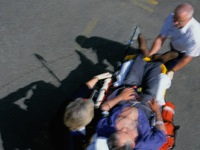
Getty Images
By Amanda MacMillan
WEDNESDAY, June 20, 2012 (Health.com) ? When people think of post-traumatic stress disorder (PTSD), they?re apt to picture combat veterans or the victims of violence and sexual assault. But new research suggests post-traumatic stress is also common following another kind of harrowing experience: heart attacks.
As many as 1 in 8 people who survive a heart attack will go on to develop symptoms of PTSD, a new analysis has found. And to make matters worse, PTSD symptoms appear to increase the risk of having a second heart attack or dying prematurely.
A heart attack, in which blood flow to the heart is suddenly interrupted, is a common?and sometimes terrifying?experience, says Donald Edmondson, PhD, the lead author of the analysis and an assistant professor of behavioral medicine at Columbia University Medical Center, in New York City.
?About 1.4 million people [in the United States] have heart attacks every year; that?s as many people as are in our entire active military,? Edmondson says. ?That feeling that your life is in danger?the loss of control when your body turns on you?is something that these people have a hard time forgetting.?
Previous research has found that heart attacks can contribute to depression, and a number of small studies have suggested a similar link to PTSD, a type of anxiety disorder. To assess just how common the disorder is in this population, Edmonson and his colleagues pooled and re-analyzed the results of 24 studies comprising 2,384 heart attack survivors from around the world.
Overall, 12% of study participants developed significant PTSD symptoms after having a heart attack, and 4% met the official criteria for a PTSD diagnosis. Although the methods varied from study to study, researchers generally focused on classic symptoms of the disorder, including frequent nightmares or flashbacks, intrusive thoughts, and elevated blood pressure or heart rate.
The findings, which appear this week in the journal PLoS ONE, are important for doctors and especially cardiologists, most of whom aren?t trained to look for signs of anxiety in heart patients, says Ramin Ebrahimi, MD, an interventional cardiologist and clinical professor of medicine at the University of California, Los Angeles.
?It has become hard for physicians to have a holistic approach and to consider the whole picture,? says Ebrahimi, who was not involved in the new analysis. ?As a cardiologist, my main focus is opening the artery and making sure the medication is appropriate. Most doctors aren?t thinking about whether the person is scared or traumatized at that point.?
Next page: Can PTSD make things worse?
shumpert hopkins hopkins dear john derrick rose torn acl pacers undrafted free agents
No comments:
Post a Comment
Note: Only a member of this blog may post a comment.